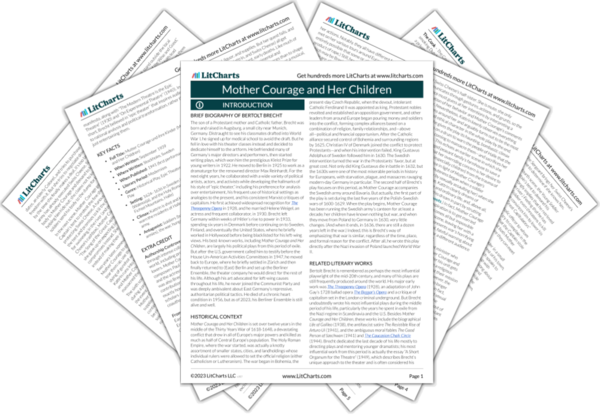The Thirty Years’ War was technically a conflict between Catholics and Protestants, but Mother Courage and Her Children makes it clear that the war was really about power, not God. While the competing empires used religion to forge alliances and justify violence, Brecht suggests that their faith was never sincere. For instance, the Chaplain initially preaches that death in battle is really holy martyrdom on behalf of the Protestant cause, but by the play’s halfway point, he has started pretending to be Catholic so that the German army will spare him, and he has even started begging Mother Courage to sleep with him. Perhaps even the most dedicated believers can lose their faith amidst the perils of war, or perhaps the Chaplain was never particularly devout and actually joined the church out of self-interest. In contrast, ordinary people seem to actually believe that God cares about the war: in the penultimate scene, the Old Peasant and Old Peasant Woman desperately pray for God to save their village, only for Kattrin to actually save the town by banging on her drum and waking everybody up. Brecht’s implication is clear: only humans can save humans from atrocities; religion is far more likely to cause violence than prevent it. This is because it’s a straightforward way to divide people who would not otherwise see themselves as different. For example, because the war’s combatants are all Europeans who share the same languages and cultural heritage, it is often difficult for the audience (and even the characters) to tell which side any given army belongs to. But as a left-wing artist and avowed atheist who had recently fled Nazi Germany, Brecht knew all too well how oppressive regimes can use religion to draw a sharp distinction between friends and foes. Through his depiction of the futile conflict between Catholics and Protestants in the Thirty Years’ War, he aimed to remind his fellow Germans that they were being manipulated into turning against ethnic and religious minorities. Thus, Brecht presents religion as not just a useless lie, but actually as a form of social control that turns people against one another.
Faith and Identity ThemeTracker

Faith and Identity Quotes in Mother Courage and Her Children
EILIF. I laughed. And so we got to talking. I came right down to business and said: “Twenty guilders an ox is too much, I bid fifteen.” Like I wanted to buy. That foxed ’em. So while they were scratching their heads. I reached for my good sword and cut ’em to ribbons. Necessity knows no law, huh?
COMMANDER. What do you say, keeper of souls?
CHAPLAIN. Strictly speaking, that saying is not in the Bible. Our Lord made five hundred loaves out of five so that no necessity should arise. So when he told men to love their neighbors, their bellies were full. Things have changed since his day.
COMMANDER. (laughing) Things have changed!
CHAPLAIN. My dear Cook, you talk as if dying for one’s beliefs were a misfortune—it is the highest privilege! This is not just any war, remember, it is a religious war, and therefore pleasing unto God.
COOK. I see that. In one sense it’s a war because of all the cheating, plunder, rape, and so forth, but it’s different from all other wars because it’s a religious war and therefore pleasing unto God. At that it does make you thirsty.
MOTHER COURAGE. I must get you two something to drink, or you’ll be making improper advances out of sheer boredom.
CHAPLAIN. That is indeed a temptation—said the Court Chaplain as he gave way to it. And who is this captivating young person?
COOK. And King Gustavus liberated Poland from the Germans. Who could deny it? Then his appetite grew with eating, and he liberated Germany from the Germans. Made quite a profit on the deal, I’m told.
CHAPLAIN. That is a calumny! The Swedish king puts religion first!
MOTHER COURAGE. What’s more, you eat his bread.
COOK. I don’t eat his bread: I bake his bread.
MOTHER COURAGE. He’ll never be conquered, that man, and you know why? We all back him up—the little fellows like you and me. Oh yes, to hear the big fellows talk, they ‘re fighting for their beliefs and so on, but if you look into it, you find they’re not that silly: they do want to make a profit on the deal. So you and I back them up!
IN WAR MORE CHRISTIAN SOULS THAN EVER
REACH THEIR ETERNAL RESTING PLACE.
[…]
AND WHAT IS WAR? THIS IS MY THESIS:
IT’S WHAT THE WORLD IS FOUNDED ON.
War is like love: it’ll always find a way. Why should it end?
CHAPLAIN. Your intentions are only too transparent! (to MOTHER COURAGE:) But when I see you take peace between finger and thumb like a snotty old handkerchief, the humanity in me rebels! You want war, do you? Well, don’t you forget the proverb: who sups with the devil must use a long spoon!
MOTHER COURAGE. Remember what one fox said to another that was caught in a trap? “If you stay there, you’re just asking for trouble.” I’m not in love with war, Mr. Army Chaplain, and when it comes to calling people hyenas, you and I part company!
CHAPLAIN. Then why all this grumbling about the peace? Is it just for the junk in your wagon?
MOTHER COURAGE. My goods are not junk. I live off them.
CHAPLAIN. You live off war. Exactly!
(KATTRIN, unperceived, has crept off to the wagon, has taken something out of it, put it under her skirt, and has climbed up the ladder to the roof.)
PEASANT WOMAN. Be mindful of the children in danger, especially the little ones, be mindful of the old folk who cannot move, and of all Christian souls, O Lord.











